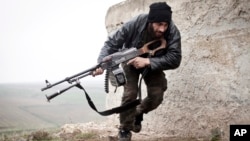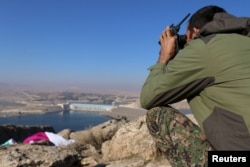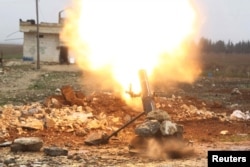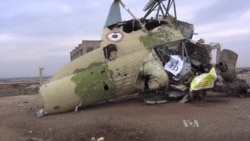Syrian rebels warn their five-year-long struggle to oust President Bashar al-Assad will go underground, if they are deserted by Western backers or an attempt is made to foist an unacceptable political deal on them. They will wage a relentless guerrilla campaign against the Assad regime and “foreign invaders” from Iran and Russia, turning the war into a national liberation fight, rebel commanders and opposition politicians say.
Talk of a guerrilla war fought along the lines of the Mujahideen’s successful albeit bloody war to oust Russian occupiers in Afghanistan has mounted in recent days and it is the focus of discussions between rebel commanders now as they wrestle with the implications of Thursday’s announcement in Munich by foreign powers of a “partial cease-fire” in Syria.
Rebel commanders and opposition politicians are greeting with deep skepticism the announcement by the International Syria Support Group (ISSG) of 17 foreign powers, including Russia, of a cessation of hostilities along with the delivery of humanitarian aid within a week to besieged areas of the war-torn country with deep skepticism.
With the partial cease-fire deal announced by the ISSG in Munich not including a clear commitment from the Kremlin to end blistering Russian airstrikes immediately — a key demand of the Syrian opposition — the rebels dismiss the idea that Munich represents a breakthrough in the search for a political solution to end the brutal five-year-long civil war that has left upwards of 250,000 dead.
They view it instead as another way-station on a road that will lead to an inevitable Western-backed negotiated political deal that they won’t be able to accept.
Fighters are angrier
Some even once pro-Western rebel commanders are expressing increasingly sharp anti-American sentiments and warn that their fighters are even angrier.
“Fighters on the front-lines have some very harsh things to say about the West,” says Mohammed Adeeb, a senior figure in the 10,000-strong Shamiya Front, an alliance of secular and nationalist armed factions.
Speaking in Munich after lengthy talks, U.S. Secretary of State John Kerry said a U.N. task force would “work to develop the modalities for a long term and durable cessation of violence”. He acknowledged, though, that the deal was only so good as the paper it is written on and much further works is needed.
But some rebels and opposition politicians are drawing comparisons with another piece of paper signed in Munich in 1938.
Formally, the Syrian Coalition, the main political opposition group, is welcoming the idea for a cessation of hostilities — saying the civilians need desperately a lessening of the violence and to receive humanitarian aid. “The conditions on the other side of the border are really terrible,” says Nader Othman, deputy prime minister in the opposition's Syrian Interim Government.
But he fears the Russians are playing a game to sap Western resolve and to divide further the West from the anti-Assad opposition. “This will only end this phase of the regime’s offensive. The regime and its Russian backers will exploit the cease-fire,” he worries.
Cease-fire vs cessation of hostilities
Pro-opposition civil society activists also remain highly doubtful about the deal and what it may hold. “I will welcome the delivery of aid to all areas that need it,” says Bassam al-Kuwaiti, a well-known figure in opposition circles.
“As to the cease-fire, a political transition should start at the same time, or we will be allowing the Assad forces to capture lands under the banner of fighting the Islamic State or Jabhat al-Nusra, and therefore to obtain a powerful position that enables it to halt any political change,” he says.
He cautions: “It is very important to distinguish between a cease-fire and a cessation of hostilities. With the first there are monitoring mechanisms, as for the latter there are no such mechanisms and it is left to the parties to decide how to implement it.”
He fears the cessation offer is designed also to split opposition forces.
That view is shared by rebel commanders. And in the hours since the deal was announced, more militias have voiced if not outright disapproval, huge doubts. Few want to be seen dismissing the deal out of hand, fearful of being seen as saboteurs of a deal that might bring some relief to civilians.
“We are skeptical that Russia will hold to these commitments when its current policy is to indiscriminately bomb all parties in Syria into the dust, in particular civilians and moderate opposition, and with complete impunity, while saying they are bombing terrorists,” the Southern Front, an alliance of factions in the south of the country, said in a statement Friday.
The biggest concern of rebel commanders in north Syria is that the Russian-backed regime will use the cessation of hostilities as a PR cover for a shift in battlefield focus, one Western powers will have inadvertently provided a stamp of approval for and won’t be able to object to later.
The Munich deal writes out any cessation of hostilities for not only the Islamic State but al-Qaida affiliate Jabhat al-Nusra or other groups deemed terrorists by the UN Security Council. Some of those groups, aside from IS, have been battlefield allies of other rebel factions around Aleppo.
It remains unclear at the moment if Islamist militia Ahrar al-Sham, an al Nusra ally and one of the most powerful armed anti-Assad armed factions, is outside the scope of the Munich deal, too.
Watch: Kurdish Forces Capture Rebel-Held Air Base in Syria
Even so, al Nusra and Ahrar al-Sham are the dominant forces in the rebel Army of Conquest alliance in Idlib, the neighboring province to Aleppo. With the regime having tightened the noose on the rebels in Aleppo and cutting their main supply line to the border with Turkey at Bab al-Salameh,rebel groups will need to ferry in supplies via Idlib from the border crossing at Bab al-Hawa.
Some rebel commanders say they will have no choice but to back up al Nusra and Ahrar al-Sham, if a post-Munich regime offensive unfolds in Idlib — not just out of comradeship for other anti-Assad fighters but because a collapse by their forces there would weaken moderate and nationalist militias in Aleppo, too.
Midweek, Gen. Salem Idris, the former chief of staff of the Western-backed Free Syrian Army, told VOA that he thought within days the Russians would start bombing Idlib.
“They want to close down Bab al-Hawa,” he said.
The Shamiya Front’s Adeeb also sees Idlib as the inevitable next focus of the phased Russian-backed regime offensive — and would have been regardless of a Munich deal being agreed by the ISSG.
He says of al Nusra and Ahrar al-Sham: “We don’t coordinate militarily on the battlefield with them but we do have a saying that any rife trained on Assad deserves our support.” Rebel commanders say that regardless of what they decide to do in the event Idlib is targeted their own militiamen will want to fight there, weakening the coherence of moderate factions, if they resist the demands of their ranks.
Assad's future
Whatever the near future holds for the Syrian revolution against Assad, Nader Othman of the Syrian Interim Government insists the regime won’t win. “They might take more land and occupy it. There will be a resistance, it will revert to a guerrilla war, and Syrians can make things even harder for the Russians than they experienced in Afghanistan.”
He adds: “Our mistake was not to see our revolution as a national liberation struggle. This is no longer a civil war — we are occupied by many foreign forces and we should make that clear. This is now a war to eject foreign invaders.”









